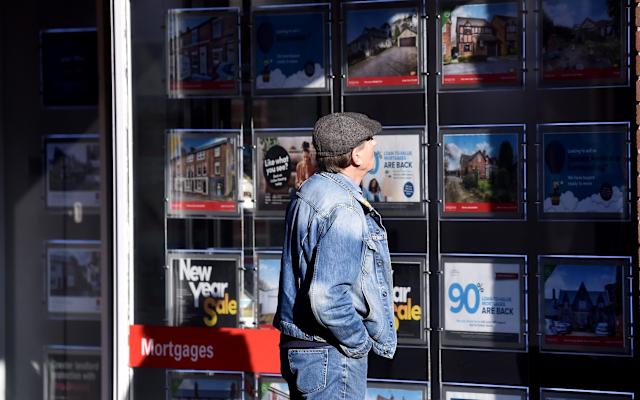
House prices stalled last month as a slowdown in the jobs market and concerns about the economy knocked confidence, an industry survey showed.
The value of a typical home was unchanged in June compared to May, according to the Halifax house price index.
Prices have only risen in two of the past seven months, according to the survey, which showed property values fell 0.3pc between April and May.
Average house prices stood at £296,665, which was up 2.5pc compared to the same time last year – and also a slight slowdown from May.
Halifax head of mortgages Amanda Bryden said: “Affordability is still stretched, particularly for those coming to the end of fixed-rate deals.
“The economic backdrop also remains uncertain; while inflation has eased, it’s still above target, and there are signs the job market may be softening.”
Official statistics last month showed Britain’s unemployment rate rose to a four-year high of 4.6pc in the three months to April, while the number of people on payrolls fell by 55,000 between March and April.
Bank of England governor Andrew Bailey warned last month that there are signs Rachel Reeves’s £25bn National Insurance raid is hitting jobs and pay.
Ashley Webb of Capital Economics said: “So, the big picture is that the housing market remains weak and it still struggling to regain momentum from the stamp duty-induced lull and the recent deterioration in the labour market.”
Separate data from Nationwide showed house prices fell at the fastest pace since February 2023 in June.
It said the value of the average home fell 0.8pc to £271,619, which was well below analyst estimates for a 0.1pc increase in prices.
10:32 AM BST
That’s it for today
Thanks for following our coverage of the latest house prices index data, which showed the property market stalled in June.
Follow the latest business and property news here.
09:45 AM BST
Housebuilders shrug off market stagnation
Housebuilding stocks climbed despite the Halifax data showing the property market stalling between May and June.
Developers gained 0.3pc across the FTSE 100 and FTSE 250. Vistry was the best performer, rising by 1pc.
Persimmon was the weakest housebuilder, falling 0.3pc.
09:06 AM BST
Northern Ireland has strongest property market
Northern Ireland has by far the strongest annual house price growth in the UK, according to Halifax.
Prices rose by 9.6pc over the past year to an average of £212,189.
Scotland recorded the next strongest annual house price growth in June, increasing by 4.9pc to £214,891, while Wales rose 3.9pc to £229,622.
Among English regions the North West has the highest rate of property price inflation, up 4.4pc over the last year to £241,938.
Story ContinuesThe South West and London had the weakest growth, up 0.5pc and 0.6pc, respectively.
However, London remains by far the most expensive part of the UK, according to Halifax with the average home now priced at £540,048.
08:31 AM BST
Housing market hit by ‘turbulent global economy and stamp duty’
Nathan Emerson, chief executive of estate agent body Propertymark, said the drop in house prices showed “the UK housing market has faced considerable upheaval in response to a turbulent global economy and stamp duty thresholds”.
He added: “However, the UK Government is expressing a lot of positive noises to boost England’s housing supply and increase confidence in the housing market in general.
“These include creating a National Housing Bank to invest in building 500,000 new homes, and the speed at which the Planning and Infrastructure Bill has progressed through Parliament so far, all of which should have long-term benefits, alongside the devolved administrations meeting their own housing targets.”
08:10 AM BST
Interest rate cuts will boost house prices, says Halifax
House prices will grow in the second half of the year as the Bank of England cuts interest rates, Halifax said.
Money markets indicate the Bank of England will cut interest rates two more times before the end of the year.
Policymakers left interest rates on hold at 4.25pc in June, with inflation well above the Bank’s 2pc target at 3.4pc.
Halifax head of mortgages Amanda Bryden said: “With markets pricing in two more rate cuts from the Bank of England by year end, and the average rate on newly drawn mortgages now at its lowest since 2023, we continue to expect modest house price growth in the second half of the year.”
Matt Thompson, head of sales at estate agency Chestertons, says: “Property buyers were hoping for another interest rate cut last month but higher-than-expected inflation diminished those odds.”
“On a national level, some house hunters opted to pause their search or change their search criteria to find a home within their budget.”
07:47 AM BST
First-time buyers helped by looser affordability checks
Halifax said lenders were “taking a more flexible approach to affordability assessments” as they attract more first-time buyers.
It said it had helped more than 1,000 first-time buyer numbers get on the property ladder over the last two months.
They were part of an extra 3,000 buyers who were able to “access a mortgage they wouldn’t have qualified for before” under new regulatory guidance.
Changes to Bank of England guidance in March meant lenders relaxed their stress tests. The Government and regulators, including the Financial Conduct Authority (FCA), have been calling for lenders to relax their rules.
Katy Eatenton of Lifetime Wealth Management, said: “The Halifax are spot on in highlighting the increased flexibility lenders as a whole are taking when it comes to affordability.
“This has without doubt softened the lull in activity following the stamp duty deadline.”
Babek Ismayil of home-buying platform OneDome, added: “Affordability remains an issue for many prospective homeowners so it’s no surprise to see the Halifax singling it out once again.
“Lenders have been really innovating in recent months in an effort to solve the ever-present obstacle of affordability and while progress has been made it’s still a huge hurdle for first-time buyers.”
07:32 AM BST
Property market ‘struggling for momentum’ after stamp duty hikes
House prices were flat between May and June as the property market struggled to regain momentum from the rise in stamp duty, economists have said.
Capital Economics said the Halifax data “chimes with the recent weakness” in figures from rival lender Nationwide, where annual price growth fell to an 11-month low in June.
UK economist Ashley Webb said: “So, the big picture is that the housing market remains weak and it still struggling to regain momentum from the stamp duty-induced lull and the recent deterioration in the labour market.”
He added that its latest forecast for the Bank of England to lower interest rates from 4.25pc now to 3pc next year “suggests that lower mortgage rates may boost house prices by more than we expect in 2026”.
07:23 AM BST
Housing market ‘stabilising, not slowing’, insist estate agents
Estate agents were trying to put a positive spin on the flat housing market growth between May and June.
Foxtons chief executive Guy Gittins said: “Despite house price growth remaining flat on a month to month basis, today’s Halifax figures continue to illustrate the strength in the market with the longer term view of market health showing house prices remain higher on an annual basis.
“We’ve already seen a heightened degree of activity over the first six months of the year and, as we head into the second half of the year, our expectation is that market activity will continue to strengthen.”
Verona Frankish, chief exective of Yopa, said: “The latest house price data from Halifax paints a picture of a market that is stabilising, not slowing.
“The fact that prices remained flat rather than falling in June suggests that buyer sentiment is improving and many are adjusting to current borrowing conditions and new stamp duty thresholds.
She added: “With the summer traditionally being a busy season, we’re optimistic that transaction levels will pick up further, especially if mortgage rates become more competitive.”
07:09 AM BST
Good morning
Thanks for joining me. House prices were unchanged between May and June amid an uncertain economic backdrop, Halifax has said. Here is what you need to know.
5 things to start your day
1. US trade deal makes Britain top investment destination in the world - Finance chiefs are more willing to bet on the UK as appetite for expansion increases
2. Reeves pours millions into Peak District carbon capture scheme - Chancellor’s National Wealth Fund backs plan to store cement and lime factory emissions underground
3. Europe needs a ‘reality check’ on net zero, says airline boss - IndiGo chief Pieter Elbers says economic progress must not be sacrificed for sustainability
4. Trump’s tariff threats trigger air freight scramble to beat impending deadline - Scramble to beat July 9 deadline pushes up cost of transporting goods by 11pc
5. Hundreds of staff unpaid after £1bn AI start-up goes bust - Workers unable to claim redundancy payments since tech company declared bankruptcy in May
What happened overnight
Stock markets mostly slipped in Asia as the deadline for US tariffs loomed on countries around the world.
The United States is close to finalising several trade agreements in the coming days and will notify other countries of higher tariff rates by July 9, President Donald Trump said on Sunday, with the higher rates to take effect on August 1.
“President Trump’s going to be sending letters to some of our trading partners saying that if you don’t move things along, then on August 1 you will boomerang back to your April 2 tariff level,” US treasury secretary Scott Bessent told CNN.
Mr Trump in April announced a 10pc base tariff rate on most countries and higher “reciprocal” rates ranging up to 50pc, with an original deadline of this Wednesday.
However, Trump also said levies could range in value from “maybe 60pc or 70pc”, and threatened an extra 10pc on countries aligning themselves with the “Anti-American policies” of the Brics group of Brazil, Russia, India and China.
With very few actual trade deals done, analysts had always suspected the date would be pushed out, though it was still not clear if the new deadline applied to all trading partners or just some.
Japan’s Nikkei lost 0.6pc, while South Korean stocks rose 0.4pc. MSCI’s broadest index of Asia-Pacific shares outside Japan eased 0.6pc, as Chinese blue chips dropped 0.5pc.
Broaden your horizons with award-winning British journalism. Try The Telegraph free for 1 month with unlimited access to our award-winning website, exclusive app, money-saving offers and more.














